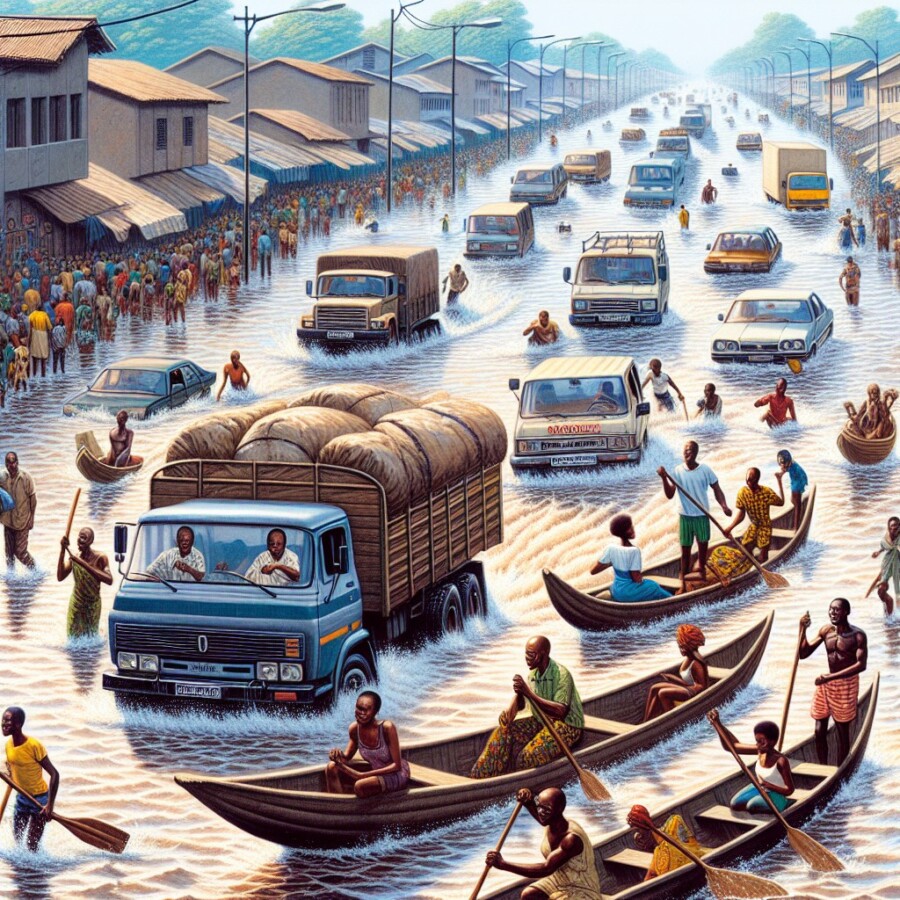Floods in the Democratic Republic of Congo have caused a lot of trouble in the capital city of Kinshasa. The River Congo, which goes through the country, has reached its highest level in 60 years. This means that water has been pouring into people’s homes and covering the roads. Other areas outside of the capital have also been affected by the flooding. Sadly, over 300 people have lost their lives in the floods over the past few months. People in Kinshasa have reported that schools, hospitals, and churches have been destroyed, and many have lost their homes and belongings.
The situation in Kinshasa is really bad. People say that their houses are filled with water and important places have been destroyed. The city has a lot of small rivers and streams that are usually used as open sewers, and now many of them are overflowing. People are using canoes to get around the flooded streets, and trucks are driving carefully through the water. The River Congo has risen to a level just below the worst flooding in 1961, which has caused more damage in other cities like Kisangani.
The flooding has not only affected the Democratic Republic of Congo, but also the neighboring country of Congo-Brazzaville. More than 336,000 people and 34 health facilities have been impacted by the floods in Congo-Brazzaville. People think that climate change is one of the reasons why there has been so much heavy rain, which has caused the flooding. This is not the first time that Kinshasa has had such terrible floods. Something similar happened just over a year ago and more than 120 people died.
The situation in the Democratic Republic of Congo shows how much damage climate change can do to communities that are already vulnerable. It reminds us that we need to take action to address climate change and reduce its effects.
Original news source: DR Congo floods: Chaos in Kinshasa as river rises to near-record level (BBC)
🎧 Listen:
Slow
Normal
Fast
📖 Vocabulary:
| 1 | floods | Large amounts of water covering areas that are usually dry |
| 2 | capital | The city where the government of a country is located |
| 3 | pouring | Flowing quickly and in large amounts |
| 4 | affected | Changed or influenced by something, usually in a bad way |
| 5 | belongings | Personal items that someone owns |
| 6 | destroyed | Completely ruined or spoiled |
| 7 | overflowing | When something is filled beyond its capacity, especially with water |
| 8 | canoes | Small boats that are moved using paddles |
| 9 | trucks | Large vehicles used for carrying goods |
| 10 | risen | Increased or went up |
| 11 | impacted | Affected or changed in a significant way |
| 12 | climate | The weather patterns and conditions of the Earth |
| 13 | vulnerable | Easily hurt or harmed |
| 14 | communities | Groups of people living together in one area |
| 15 | address | To think about and begin to deal with a problem or issue |
Group or Classroom Activities
Warm-up Activities:
– News Summary
Instructions: Divide the class into pairs or small groups. Give each group a copy of the article. Instruct the students to read the article and summarize the main points in their own words. After they have finished, have each group share their summaries with the class.
– Opinion Poll
Instructions: Write the following question on the board: “Do you think enough is being done to address climate change? Why or why not?” Instruct the students to individually write down their opinions and reasons. Then, divide the class into small groups and have them discuss their opinions and reasons. After the discussion, have each group share their thoughts with the class.
– Vocabulary Pictionary
Instructions: Write a list of vocabulary words from the article on the board (e.g. floods, capital city, pouring, destroyed, vulnerable, etc.). Divide the class into pairs or small groups. Give each group a set of drawing materials. Instruct the students to take turns selecting a word and drawing a picture to represent it. The other students in the group must guess the word based on the drawing. The group that guesses the most words correctly wins.
– Speed Summarizing
Instructions: Divide the class into pairs. Give each pair a copy of the article. Set a timer for 2 minutes. Instruct the students to take turns summarizing the article to their partner within the given time limit. After 2 minutes, have the pairs switch roles and summarize the article again. After both students have had a chance to summarize, bring the class together and have a few volunteers share their summaries with the class.
– Future Predictions
Instructions: Divide the class into small groups. Give each group a sheet of paper and instruct them to write down three predictions about the future impact of climate change on vulnerable communities. They can base their predictions on the information in the article or their own knowledge and opinions. After they have finished, have each group share their predictions with the class and discuss the likelihood of each prediction coming true.
🤔 Comprehension Questions:
1. What has been causing trouble in the capital city of Kinshasa in the Democratic Republic of Congo?
2. How long has it been since the River Congo reached its highest level?
3. How have the floods affected areas outside of the capital?
4. How many people have lost their lives in the floods over the past few months?
5. What have people in Kinshasa reported about the destruction caused by the floods?
6. Why are people using canoes and trucks to navigate the flooded streets in Kinshasa?
7. Which neighboring country has also been affected by the flooding?
8. Why do people think climate change is one of the reasons for the heavy rain and flooding?
Go to answers ⇩
🎧✍️ Listen and Fill in the Gaps:
Floods in the Democratic Republic of (1)______ have caused a lot of trouble in the (2)______ city of (3)______. The River Congo, which goes through the (4)______, has reached its highest level in 60 years. This means that water has been pouring into people’s homes and covering the roads. Other areas outside of the capital have also been affected by the flooding. Sadly, over 300 people have lost their lives in the floods over the past few months. People in Kinshasa have reported that schools, hospitals, and churches have been (5)______, and many have lost their homes and belongings.
The situation in Kinshasa is really bad. People say that their houses are filled with water and (6)______ places have been destroyed. The city has a lot of small rivers and streams that are usually used as open (7)______, and now many of them are overflowing. People are using canoes to get around the (8)______ streets, and trucks are driving carefully through the water. The (9)______ Congo has risen to a (10)______ just below the worst flooding in 1961, which has caused more damage in other (11)______ like Kisangani.
The flooding has not only affected the Democratic Republic of Congo, but also the neighboring country of Congo-Brazzaville. More than 336,000 people and 34 health (12)______ have been impacted by the floods in Congo-Brazzaville. People think that climate change is one of the reasons why there has been so much heavy rain, which has caused the flooding. This is not the (13)______ time that Kinshasa has had such terrible (14)______. Something similar happened just over a year ago and more than 120 people died.
The situation in the Democratic Republic of Congo (15)______ how much damage (16)______ change can do to communities that are already vulnerable. It reminds us that we need to take action to address climate change and reduce its effects.
Go to answers ⇩
💬 Discussion Questions:
Students can ask a partner these questions, or discuss them as a group.
1. How would you feel if your house was filled with water and important places in your city were destroyed?
2. Do you think climate change is causing more heavy rain and flooding? Why or why not?
3. What do you think can be done to address climate change and reduce its effects?
4. Have you ever experienced a natural disaster in your country? If so, how did it affect you and your community?
5. What are some ways that people can help those affected by flooding and other natural disasters?
6. How do you think the flooding in the Democratic Republic of Congo has impacted the lives of the people there?
7. Do you think the government should provide assistance to those affected by the floods? Why or why not?
8. What are some ways that communities can prepare for and respond to natural disasters like flooding?
9. How do you think the flooding has affected the economy of the Democratic Republic of Congo?
10. What are some ways that individuals can contribute to reducing the effects of climate change in their daily lives?
11. How do you think the flooding has affected the mental health of the people in the affected areas?
12. What are some long-term solutions that could help prevent or minimize the impact of future floods in the Democratic Republic of Congo?
13. How would you feel if you had to use a canoe to get around your city because of flooding?
14. Do you think the international community should provide aid to the Democratic Republic of Congo and Congo-Brazzaville? Why or why not?
15. What is the role of education in raising awareness about climate change and its effects?
Individual Activities
📖💭 Vocabulary Meanings:
Match each word to its meaning.
Words:
1. floods
2. capital
3. pouring
4. affected
5. belongings
6. destroyed
7. overflowing
8. canoes
9. trucks
10. risen
11. impacted
12. climate
13. vulnerable
14. communities
15. address
Meanings:
(A) Large amounts of water covering areas that are usually dry
(B) Groups of people living together in one area
(C) The city where the government of a country is located
(D) Increased or went up
(E) Flowing quickly and in large amounts
(F) Affected or changed in a significant way
(G) Personal items that someone owns
(H) Easily hurt or harmed
(I) Small boats that are moved using paddles
(J) Changed or influenced by something, usually in a bad way
(K) The weather patterns and conditions of the Earth
(L) When something is filled beyond its capacity, especially with water
(M) Completely ruined or spoiled
(N) To think about and begin to deal with a problem or issue
(O) Large vehicles used for carrying goods
Go to answers ⇩
🔡 Multiple Choice Questions:
1. What has caused the floods in the Democratic Republic of Congo?
(a) Earthquakes and volcanic eruptions
(b) Heavy rain and the River Congo reaching its highest level in 60 years
(c) Drought and lack of water
(d) Strong winds and hurricanes
2. How many people have lost their lives in the floods over the past few months?
(a) Over 300
(b) Over 1000
(c) Over 500
(d) Over 200
3. What has been destroyed in Kinshasa due to the floods?
(a) Shopping malls and restaurants
(b) Parks and playgrounds
(c) Museums and art galleries
(d) Schools, hospitals, and churches
4. How are people in Kinshasa getting around the flooded streets?
(a) Riding bicycles
(b) Walking on stilts
(c) Using canoes
(d) Swimming
5. Which river has reached a level just below the worst flooding in 1961?
(a) River Nile
(b) River Amazon
(c) River Thames
(d) River Congo
6. Which neighboring country has also been impacted by the floods?
(a) Angola
(b) Uganda
(c) Congo-Brazzaville
(d) Rwanda
7. What do people think is one of the reasons for the heavy rain causing the flooding?
(a) Climate change
(b) Deforestation
(c) Pollution
(d) Overpopulation
8. What does the situation in the Democratic Republic of Congo remind us about?
(a) The importance of building more dams and reservoirs
(b) The damage climate change can do to vulnerable communities
(c) The need for more roads and bridges
(d) The benefits of living near rivers and streams
Go to answers ⇩
🕵️ True or False Questions:
1. Schools, hospitals, and churches in Kinshasa have remained intact, and only a few people have lost their homes and belongings.
2. Flooding in the Democratic Republic of Congo has had minimal impact on the capital city of Kinshasa.
3. People in Kinshasa are avoiding canoes to navigate the flooded streets, while trucks are struggling to drive through the water.
4. The River Congo, which runs through the country, has reached its highest level in 60 years.
5. Other areas outside of the capital have also been affected by the floods.
6. The flooding has also impacted the neighboring country of Congo-Brazzaville, affecting over 336,000 people and 34 health facilities.
7. Only a few people have lost their lives in the floods over the past few months.
8. The flooding has resulted in water pouring into people’s homes and covering the roads in Kinshasa.
Go to answers ⇩
📝 Write a Summary:
Write a summary of this news article in two sentences.
Check your writing now with the best free AI for English writing!
Writing Questions:
Answer the following questions. Write as much as you can for each answer.
Check your answers with our free English writing assistant!
1. What has caused the flooding in the Democratic Republic of Congo?
2. How has the flooding affected the capital city of Kinshasa?
3. What are some of the consequences of the flooding in Kinshasa?
4. How are people in Kinshasa getting around the flooded streets?
5. Why do people think climate change is a factor in the flooding?
✅ Answers
🤔✅ Comprehension Question Answers:
1. What has been causing trouble in the capital city of Kinshasa in the Democratic Republic of Congo?
The floods have been causing trouble in Kinshasa.
2. How long has it been since the River Congo reached its highest level?
The River Congo has reached its highest level in 60 years.
3. How have the floods affected areas outside of the capital?
The floods have also affected other areas outside of the capital.
4. How many people have lost their lives in the floods over the past few months?
Over 300 people have lost their lives in the floods over the past few months.
5. What have people in Kinshasa reported about the destruction caused by the floods?
People in Kinshasa have reported that schools, hospitals, and churches have been destroyed, and many have lost their homes and belongings.
6. Why are people using canoes and trucks to navigate the flooded streets in Kinshasa?
People are using canoes and trucks to navigate the flooded streets because the water has filled their houses and important places have been destroyed.
7. Which neighboring country has also been affected by the flooding?
Congo-Brazzaville, the neighboring country, has also been affected by the flooding.
8. Why do people think climate change is one of the reasons for the heavy rain and flooding?
People think climate change is one of the reasons for the heavy rain and flooding because it has caused a lot of rain, leading to the flooding.
Go back to questions ⇧
🎧✍️✅ Listen and Fill in the Gaps Answers:
(1) Congo
(2) capital
(3) Kinshasa
(4) country
(5) destroyed
(6) important
(7) sewers
(8) flooded
(9) River
(10) level
(11) cities
(12) facilities
(13) first
(14) floods
(15) shows
(16) climate
Go back to questions ⇧
📖💭✅ Vocabulary Meanings Answers:
1. floods
Answer: (A) Large amounts of water covering areas that are usually dry
2. capital
Answer: (C) The city where the government of a country is located
3. pouring
Answer: (E) Flowing quickly and in large amounts
4. affected
Answer: (J) Changed or influenced by something, usually in a bad way
5. belongings
Answer: (G) Personal items that someone owns
6. destroyed
Answer: (M) Completely ruined or spoiled
7. overflowing
Answer: (L) When something is filled beyond its capacity, especially with water
8. canoes
Answer: (I) Small boats that are moved using paddles
9. trucks
Answer: (O) Large vehicles used for carrying goods
10. risen
Answer: (D) Increased or went up
11. impacted
Answer: (F) Affected or changed in a significant way
12. climate
Answer: (K) The weather patterns and conditions of the Earth
13. vulnerable
Answer: (H) Easily hurt or harmed
14. communities
Answer: (B) Groups of people living together in one area
15. address
Answer: (N) To think about and begin to deal with a problem or issue
Go back to questions ⇧
🔡✅ Multiple Choice Answers:
1. What has caused the floods in the Democratic Republic of Congo?
Answer: (b) Heavy rain and the River Congo reaching its highest level in 60 years
2. How many people have lost their lives in the floods over the past few months?
Answer: (a) Over 300
3. What has been destroyed in Kinshasa due to the floods?
Answer: (d) Schools, hospitals, and churches
4. How are people in Kinshasa getting around the flooded streets?
Answer: (c) Using canoes
5. Which river has reached a level just below the worst flooding in 1961?
Answer: (d) River Congo
6. Which neighboring country has also been impacted by the floods?
Answer: (c) Congo-Brazzaville
7. What do people think is one of the reasons for the heavy rain causing the flooding?
Answer: (a) Climate change
8. What does the situation in the Democratic Republic of Congo remind us about?
Answer: (b) The damage climate change can do to vulnerable communities
Go back to questions ⇧
🕵️✅ True or False Answers:
1. Schools, hospitals, and churches in Kinshasa have remained intact, and only a few people have lost their homes and belongings. (Answer: False)
2. Flooding in the Democratic Republic of Congo has had minimal impact on the capital city of Kinshasa. (Answer: False)
3. People in Kinshasa are avoiding canoes to navigate the flooded streets, while trucks are struggling to drive through the water. (Answer: False)
4. The River Congo, which runs through the country, has reached its highest level in 60 years. (Answer: True)
5. Other areas outside of the capital have also been affected by the floods. (Answer: True)
6. The flooding has also impacted the neighboring country of Congo-Brazzaville, affecting over 336,000 people and 34 health facilities. (Answer: True)
7. Only a few people have lost their lives in the floods over the past few months. (Answer: False)
8. The flooding has resulted in water pouring into people’s homes and covering the roads in Kinshasa. (Answer: True)
Go back to questions ⇧















